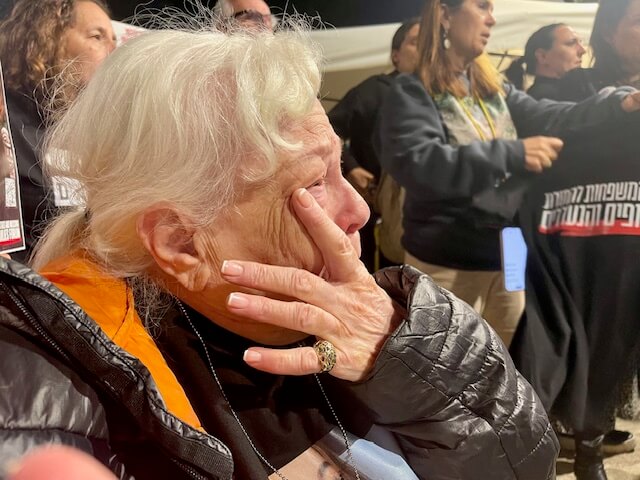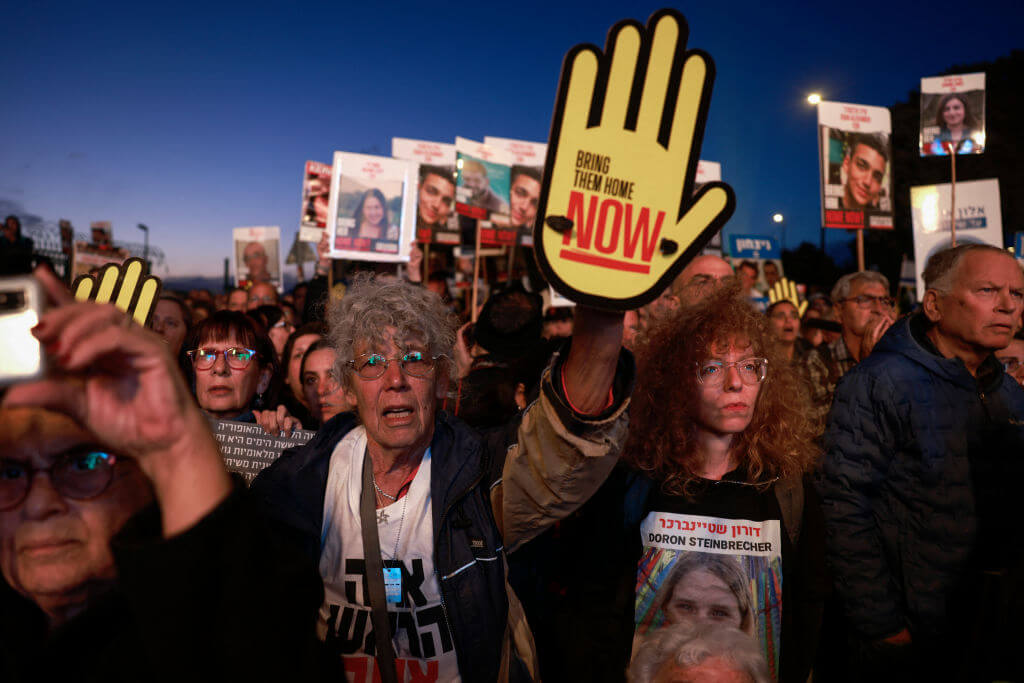‘Everyday feels like forever’: Israelis observe 6-month anniversary with sadness and frustration
Outdated hostage posters, frayed flags and an embattled prime minister’s call for unity mark somber Sunday in Jerusalem and Tel Aviv

Crowds gathered near the Knesset Sunday evening to commemorate the 6-month anniversary of Oct. 7, demand a ceasefire and call for Prime Minister Benjamin Netanyahu’s ouster. Photo by Susan Greene
JERUSALEM – Sunday marked a half-year from the day many Israelis say everything changed in their country.
Because “everything” is a concept that’s hard to hold onto, I set out to find ways, both big and small, to take measure of those changes and gauge how Israelis perceive the passage of time since Hamas’ attack on Oct. 7, 2023.
Here are observations from Hostage Square in Tel Aviv Sunday morning, a vigil in Jerusalem in the evening, and other reminders in between of how that grim day six months ago has reframed life in Israel.
Time is relative

Half a year has seemed like a lifetime for Hani Berger.
“Everyday feels like forever, frozen in not knowing where she is, what’s happening to her, waiting,” said the 74-year-old grandmother of Agam Berger, a 20-year-old army private abducted from Nahal Oz on Oct. 7.
Agam was later seen on a Hamas video being led to a car while still in her pajamas.
“I’m sick. We’re all sick. We can’t take it anymore,” Hani told me backstage at Sunday’s rally in Jerusalem, crying as she listened to other hostage families describe their experiences.
Next to her, waiting to speak to the crowd of about 50,000 was Yael Adar, mother of 38-year-old Tamir Adar, who was killed while fighting terrorists at Kibbutz Nir Oz on Oct. 7, and whose body was abducted to Gaza.
“I don’t know how it feels to other families, but for me, it has been like one sleepless, never-ending day since Oct. 7,” she told me. “This is the nightmare you don’t wake up from.”
Surrounded by friends and family, she took the stage moments later to describe the surreal passage of time.
She told the crowd, “184 days that we have not been able to mourn Tamir, his murdered friends, murdered children, my murdered friends. We are still on Oct. 7. We are still abandoned, experiencing pain and loss, living in ruin and destruction whose perpetrators are still foot-dragging and not bringing an end to the most difficult event in the history of Israeli society and an outline to return everyone, everyone.”
Hostage posters are already outdated
Posters of hostages are still plastered on walls throughout Israel. But friends and family of those who’ve had birthdays in captivity have taken to striking out their ages at the time of their abduction and writing their new ages both as a matter of record and a way to affirm their survival.
Magic Marker in hand, Ofer Ravin, an art student, updated the age of his brother’s friend, Evyatar David, from 23 to 24 Sunday morning near a bus stop on Tel Aviv’s Kaplan Street. David was abducted at the Nova rave and is presumed to still be in Hamas captivity.
“It makes no sense to have him stuck in time, as if he’s dead or something,” said Ravin, who estimates he has updated David’s age and those of other Nova abductees on about 70 posters throughout the city.
“It’s like graffiti,” he said, “but legal.”
Flags are fraying
Flags popped up throughout Israel as a symbol of patriotism in the days after Oct. 7. Not just on flagpoles, but also on street lights, in windows, hanging off balconies and tied to car antennas.
Six months and two seasons later, many are fading from the sun, fraying from the wind and rain, and seemingly forgotten.
Flag companies and hardware stores I called on Sunday said flag sales are up from a year ago, pre-Oct. 7, but significantly down from last fall.
“Maybe people are feeling less proud,” a Jewish clerk at a shop in Tel Aviv’s Florentine neighborhood told me.
His Arab Israeli co-worker put his fingers to his mouth as if zipping his lips.
We stood there, the three of us, in an awkward silence, until the Arab clerk spoke up.
“It’s like kaffiyehs, maybe,” he said of the Palestinian head scarves that most Arab Israelis consider too dangerous to wear since Oct. 7.
“Maybe some symbols change over time.”
‘This is the time for unity’
So said Israeli Prime Minister Benjamin Netanyahu in remarks marking Sunday’s six-month benchmark.
The embattled Netanyahu took the opportunity to list the country’s achievements since Oct. 7.
“We have eliminated 19 of Hamas’s 24 battalions, including senior commanders,” he said. “We have killed, wounded or captured a large number of Hamas terrorists. We have cleared out Shifa and other terrorist command centers as well. We have destroyed factories for producing rockets, command centers, and stores of weapons and ammunition, and we are continuing to systematically destroy underground installations.”
Netanyahu also used the anniversary to slam the growing number of Israelis who, in polls and protests, are criticizing his handling of the war in Gaza, failure to bring home the remaining hostages, general lack of an exit strategy, and damage to Israel’s reputation worldwide.
“It is precisely at this time that an extremist and violent minority is trying to drag the country into a rift,” Netanyahu said. “There is nothing our enemies want more. They are hoping that an internal rift and baseless hatred will stop us on the cusp of victory.”
He added: “At this moment, as the war is ongoing, we must unite to repel the attacks against us.”
‘Now is my time to protest’

Yudah Berman kept his mouth shut for the past six months in the name of patriotism.
The 60-something retired engineer figured that “wartime is no time to point fingers at your country,” he told me.
But Berman was shaken out of his silence this weekend when his nephew in the U.S. urged him to read a news investigation by the Israel-based outlets +972 Magazine and Local Call. The article detailed the Israel Defense Forces’ reliance on artificial intelligence to identify low-level Hamas militants in Gaza, as well as internal policies and practices allowing scores of civilian casualties when targeting those operatives with so-called “dumb bombs.”
“I was stunned,” Berman said about what he learned in the article.
So stunned that he borrowed one neighbor’s car and another neighbor’s “Bring them home now” sweatshirt and headed from Ramat Gan to Jerusalem during rush hour Sunday to rally near the Knesset.
“Enough! Enough!” Berman chanted with the crowd, calling for a ceasefire.
He looked at me looking at him and smiled.
“Now is the moment,” he said. “Now is my time to protest.”
















